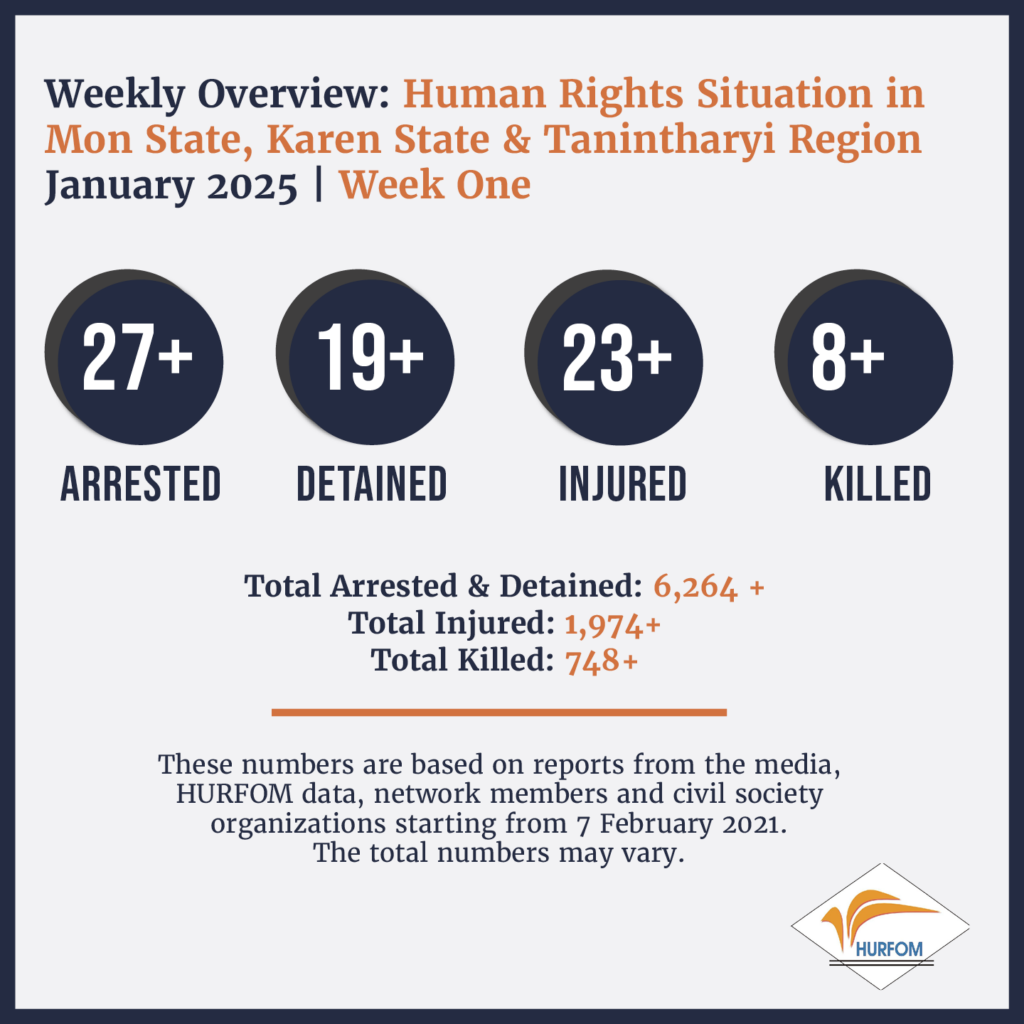Weekly Analysis: Mon State Junta Releases Prisoners on Independence Day, But Political Detainee Numbers Remain Low
January 13, 2025
Week One January 2025
On January 4, 2025, to mark the country’s Independence Day, the junta announced the release of prisoners from various prisons across the nation. The military claimed to have released more than 600 political prisoners. However, these figures, which the Political Prisoners Network Myanmar has verified, show that only about 340 were freed, which is indicative of the thousands who remain unjustly imprisoned. The amnesty serves as a reminder of the junta’s desperate quest for legitimacy while it continues to perpetrate widespread and systematic human rights violations.
While the junta tries to mislead the international community, reports from human rights organizations are furnishing vital evidence of the regime’s human rights violations. In a report released by the Assistance Association for Political Prisoners (AAPP), at least 95 civilians, including over a dozen minors, were killed by the Burma Army in December 2024 alone. Airstrikes were the primary cause of fatalities, as aerial attacks are increasingly endangering civilians.

Throughout the first week of the New Year, the Human Rights Foundation of Monland (HURFOM) also reported on falsified news relating to the junta’s release of political prisoners. In Mon State alone, 254 prisoners were reportedly granted amnesty. However, according to reports, only six political prisoners were included—five from Kyaikmayaw Prison and one from Thaton Prison.
As part of its 77th Independence Day commemorations, the junta claimed to have released 5,864 detainees nationwide. Among them, the junta spokesperson, Major General Zaw Min Tun, stated that over 600 were detained under Section 505 of the Penal Code, a provision commonly used to imprison political dissidents. However, according to the Political Prisoners Network of Myanmar (PPNM), only about half of that number were actually released.
“Our records show a significant gap between the junta’s announcements and the actual numbers of political prisoners released. It’s mostly propaganda. According to our verified list, Thaton Prison only released one political prisoner, while Kyaikmaraw Prison released five,” explained Ko Thike Tun Oo of PPNM.
The amnesty from Kyaikmayaw Central Prison included 12 male and two female detainees. Only three male and two female prisoners had been convicted under Section 505.
The released detainees across Mon State were as follows:
- Kyaikmayaw Central Prison: 14 detainees, including five political prisoners
- Thaton Prison: 36 detainees, including one political prisoner
- Yin Nyein Labor Camp: 26 detainees
- Zinkyaik Labor Camp: 18 detainees
- Inn Byone Labor Camp: 8 detainees
- Moppalin Men’s Factory Camp: 37 detainees
- Moppalin Women’s Factory Camp: 43 detainees
- In Gya Bo Rubber Plantation Camp (Shwe Phyu): 8 detainees

Despite the junta’s public claims, many view these releases as an effort to enhance its international image without making real concessions. The number of freed political prisoners remains disproportionately low compared to the thousands who continue to be unjustly imprisoned throughout the country.
Additionally, political prisoners are deliberately subjected to both mental and physical suffering as a punishment for resisting the military dictatorship. For instance, prison authorities often cut off their access to family visits and food supplies sent by their loved ones, frequently citing “security concerns” as justification. These restrictions are strategically designed to isolate and demoralize the prisoners.
Access to urgent medical treatment is another critical issue. Political prisoners suffering from skin diseases, chronic diarrhea, or respiratory conditions are often denied timely care. The neglect of these healthcare needs underscores the deliberate cruelty of the system. Additionally, they are subjected to physically demanding and strenuous labour and face regular harassment by other inmates, whom the authorities encourage to act as gang leaders to further oppress the political prisoners.




















































